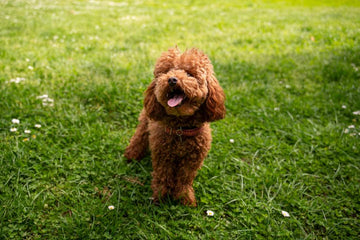
It may sound like a silly question—after all, puppies, much like babies, seem to be constantly pooping. But for first-time dog owners, understanding your puppy's potty habits is crucial for effective house training. By recognizing when your puppy will most likely need a bathroom break, you can create a consistent potty schedule—knowing when to take them outside or to their indoor grass pad.
While it can be done at any age, you can potty train puppies as early as 8 weeks, as they can learn and establish good habits more quickly than older dogs. You may overlook a few accidents in your tiny pup’s early days, but you may not be able to say the same once they grow up. So, how often do puppies poop? Let’s explore the factors that affect their potty schedule, how to train them, and what signs may signal a health concern.
Factors That Determine Your Puppy’s Potty Schedule
Understanding your puppy’s bathroom routine involves considering several factors, including age, diet, digestion, and overall health.
Diet
Your puppy’s diet plays a significant role in their bathroom schedule. Growing puppies need essential nutrients such as fiber, fatty acids, and beta-carotene, which promote frequent bowel movements. As a result, healthy puppies typically poop several times a day.
Healthy dog poop is solid, smooth, and soft. If your puppy’s stool is hard or liquid, it could suggest an intestinal issue. You may need to adjust their diet to ensure they get enough fiber, which helps firm up stool and absorb more water.
Additionally, provide plenty of water for your puppy. It’s generally recommended that puppies consume about one ounce of water per pound of body weight each day. An active puppy will need more hydration, so keep water readily available. The more your puppy drinks, the more frequently it will need to go to the bathroom. For example, a one-month-old puppy can hold its bladder for about an hour before needing to pee or poop.
Avoid giving your puppy table scraps or foods that could upset their digestion, such as greasy or spicy foods. Stick to well-balanced puppy food designed for their nutritional needs, and always monitor their water intake to prevent dehydration.
Digestion
Most young puppies need approximately four hours to digest their food. Larger puppies may take slightly longer, while smaller breeds tend to digest their food in about one and a half hours, leading to more frequent potty breaks.
When you feed your puppy, you’ll want to time their meals accordingly. For example, if you feed your puppy at 6:00 p.m., you’ll likely need to take them outside for a potty break around 10:00 p.m. Several factors, such as activity level and food type, can affect digestion time. Active puppies usually digest food faster and poop shortly after meal times.
Dry food, while nutritious, takes longer to digest than wet food. Wet food tends to be easier for puppies to chew and digest, resulting in faster potty breaks. Both dry and wet food can be healthy options, but you can choose based on your goal of either delaying or speeding up bathroom breaks.
Age
Your puppy’s age is another critical factor in determining how often it needs to poop. Newborn puppies, fed solely on their mother’s milk, don’t need to go to the bathroom until they begin transitioning to solid food around four weeks old. After that, their metabolism is very high, meaning they will need to eat often—and consequently, will need to poop frequently.
As your puppy grows older, its metabolism slows, and it will need less food. By the time your puppy reaches one year old, it will have better control of its bowels and may only need bathroom breaks 2-4 times daily. However, expect to continue potty training until they have learned to hold it in for more extended periods.
Puppy potty training can begin as early as 8 weeks old. The earlier you start, the faster your puppy will learn proper bathroom habits, so don't wait too long to begin training. Puppies learn much quicker at this young age, making it an excellent time to start teaching them the ropes. Read here for a few potty training tips and tricks.
Health Issues
Certain health conditions can also affect your puppy’s bathroom habits. If you observe any signs of abnormal bowel movements, such as diarrhea or constipation, consult your veterinarian to rule out any serious health problems.
Diarrhea
Puppies with diarrhea will need to poop more frequently. Their stool may be watery, misshapen, or discolored, and they may also show other signs such as abdominal pain or extreme thirst. Several factors can cause diarrhea, including a sudden change in diet. Intestinal parasites, such as roundworms or hookworms, can also affect your puppy’s bowel habits, potentially leading to diarrhea or blood in the stool.
If your puppy has diarrhea, make sure it stays hydrated. Offer it water regularly, and if necessary, mix some bouillon or broth to encourage drinking. Avoid feeding spicy, fatty, or difficult-to-digest foods. Stick to simple, easy-to-digest meals like unseasoned beef or chicken to help settle their stomach. Regular vet checkups and deworming treatments are also essential to keep your puppy healthy.
Constipation
Constipation is another common issue in puppies, often caused by dehydration or a lack of fiber in their diet. Puppies with constipation may pass small, dry, or hard stools or strain to defecate without success. If your puppy seems constipated, increase its water intake and add more fiber-rich foods, such as canned pumpkin, carrot sticks, or celery. These vegetables are high in water and fiber.
Avoid giving your puppy bones or rawhide chews, as they can worsen constipation. Stress and environmental changes can also contribute to constipation, so try to keep your puppy comfortable and calm.
Intestinal Blockages
Intestinal blockages occur when puppies swallow non-food objects, such as chew toys, socks, or even shoes. These items can cause constipation or other symptoms like abdominal pain and bloating. If you suspect your puppy has an intestinal blockage, take it to the vet immediately. Surgery may sometimes be required, but some objects can pass naturally.
Prevent blockages by keeping small items out of reach and providing your puppy with appropriate chew toys.

How to Start Potty Training a Puppy
Starting potty training with your puppy can be an exciting and rewarding journey. With the right approach, it can be a smooth and enjoyable process. Here are some steps you can follow to set your puppy up for success.
Create a Puppy Poop Schedule
Establishing a consistent potty schedule is essential for successful house training. Puppies need bathroom breaks after every meal, nap, and playtime. Taking your puppy outside at regular intervals helps it establish a routine, reducing the likelihood of accidents inside.
Allowing your puppy to use the bathroom whenever it wants can lead to complications. It may interrupt you during important tasks or lead to more accidents. By sticking to a consistent schedule, you can minimize these issues.
As your puppy grows, its bladder capacity increases, allowing it to hold it for longer periods. For example, a three-month-old puppy can typically hold its urine and bowels for about four hours. As your puppy ages, you can gradually adjust its potty schedule, adding an extra hour for every month older it gets.
Find a Location for Your Puppy
Puppies use their keen sense of smell to associate specific areas with bathroom breaks, making consistency key when potty training. Allowing your puppy to relieve itself wherever it pleases can lead to confusion and make it harder for them to understand where they should go. Designating a consistent potty spot—outdoors or indoors—reinforces good habits.
Using a grass pad with a tray indoors or on a balcony offers an excellent solution for apartment living or during inclement weather. It provides a familiar surface for your puppy and helps keep your home clean. In the event of accidents, always clean the area thoroughly with an enzyme-based cleaner to remove odors and discourage repeat offenses. Proper cleaning will encourage your puppy to return to the designated potty area and stay on track with their training.
Use Verbal Cues
As your puppy starts to squat to go potty, say a cue word such as "poop" or "go potty." This helps your puppy associate the cue with the action. Be consistent with the cue word and encourage everyone in your household to use it to reinforce the behavior.
After your puppy successfully goes potty, immediately reward them with praise, a treat, or a playful interaction. Positive reinforcement helps your puppy understand that they’ve done something right and motivates them to continue following the cue.
Avoid Common Mistakes
Puppies will inevitably have accidents during potty training, but remember to remain calm and patient. Never scold or punish your puppy for accidents, as this can create confusion and anxiety around potty training.
Instead, focus on positive reinforcement by praising or rewarding your puppy when they go potty in the correct spot. This encourages the behavior you want to see and helps your puppy understand what’s expected. For more tips on successful potty training, check out our guide on 4 Common Mistakes When Potty Training Your Puppy, where we dive deeper into the best practices and strategies for smoother training.
Look for Signs of Potty Time
Your puppy may start sniffing the ground or walking in circles when it needs to go to the bathroom. If you see these signs, quickly take your puppy outside or to its designated bathroom area.

So, How Often Do Puppies Poop?
The frequency with which puppies poop varies depending on their age, diet, digestion, and health. A healthy, well-fed puppy may need to poop several times a day, with their stool being firm, smooth, and consistent. If you’ve noticed issues like diarrhea or constipation, consult your vet to address potential health concerns.
Starting potty training early is key to success. Creating a potty schedule and providing positive reinforcement will teach your puppy to go potty in the right place. For potty training support, look no further than Gotta Go Grass to make the process easier. We offer grass pads for dogs, along with other helpful solutions like waste bags, treat tumblers, and more, to provide a smooth and stress-free potty training experience for you and your puppy. Visit our website today!




